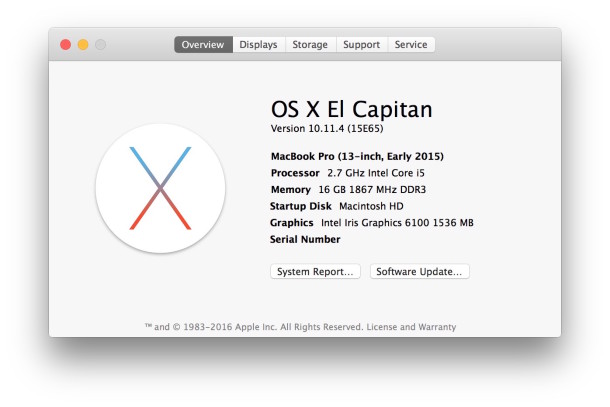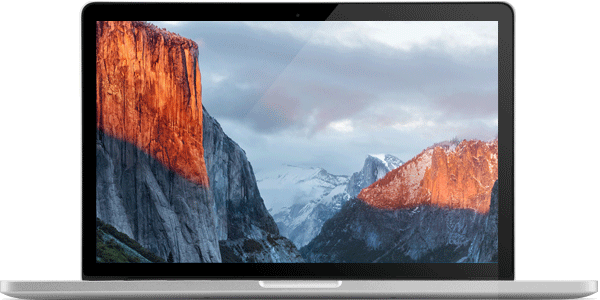The OS X 10.11 El Capitan upgrade is available only at the Mac App Store, which means if you have versions Snow Leopard 10.6.7, Mavericks, Yosemite, Lion, and Mountain Lion, the Mac App Store already exists on your computer. Mac OS 8.5.1, released December 7, 1998, was a minor update to Mac OS 8.5 that fixes several bugs that caused crashes and data corruption. Mac OS 8.6 edit Released May 10, 1999, Mac OS 8.6 added support to the Mac OS nanokernel to handle preemptive tasks via the Multiprocessing Services 2.x and later developer API. Before installing this upgrade, make sure that your Mac is ready. Check compatibility. MacOS Big Sur supports most Mac models introduced in 2013 and later. Mac OS X 10.11 (El Capitan) is required for the new Notes on iOS 9, and 10.11.6 for the iPhone XR, XS, and iOS 12 and is compatible with all Mac OS X 10.8 and later.

This tip is designed to be a one stop shop to find out what iOS you can use if you are able to install a specific Mac OS X.
Now updated for iOS 13. Including a method to downgrade to iOS 10.3.3, and a method of downgrading to iOS 11.4.

On September 19, 2019, iOS 13 was released. Present requirements for iOS 13 include Mac OS 10.11.6 for iTunes 12.8 as a bare minimum.
Two factor authentication logins for AppleID unlocks was introduced on Mac OS 10.12.4. If your iOS is current for it, you can usually use it to unlock either from another current iOS device, or http://iforgot.apple.com if you don't have a Mac.
On May 29, 2019, it was found that iOS 12.1.5 could sync with iTunes on Mac OS X 10.10.5 if you kept iTunes 12.5.5.
This thread discusses more of the inconsistent requirements that were initially stated:
https://www.imobie.com/support/how-to-downgrade-from-ios-12-to-ios-11.htm offers a means of downgrading from iOS 12 to iOS 11, if no other means work to link an elderly Mac that can't be updated to 10.11. Be very careful to backup your data properly to avoid problems. Consider a lightning port data transfer device if you need to backup data. And remember no backup is complete, unless you know you have two working copies.

Downgrading Mac OS X is possible in many cases, but your iOS is not at all. Downgrading a Mac is described here:http://discussions.apple.com/docs/DOC-1948
iOS 12 & Yosemite -is a new tip I constructed to cover what can be done for those with Yosemite when downgrading the iOS is no longer possible.
For iOS earlier than 5, see this tip:Which OS do I have and where should I post?So be sure to look this over before upgrading your iOS and backup/sync your iOS with your Mac:
Mac OS X 10.5.8 (Leopard) supports PowerPC Macs, iTunes 10.6.3, iOS 5.1.1.Mac OS X 10.6.8 (Snow Leopard) supports Intel only Macs, but does support PowerPC applications, iTunes 11.4 and iOS 6, and iOS 7.Mac OS X 10.7.3 (Lion) supports iCloud except for iCloud Drive in its current iteration and the new Notes.Mac OS X 10.7.5 (Lion) (link explains the pitfalls of losing PowerPC applications) supports iTunes 12.2.2.25 (available from Software update as of 10/24/2015), iOS 8 and iOS 9.0.Mac OS X 10.8 (Mountain Lion) is required for iTunes 12.3 and iOS 9.2 and iOS 9.2.1(except iCloud Drive, and the new notes). Does not support iOS 10 or iTunes 12.5.1 according to the Wikipedia below.Mac OS X 10.9.5 (Mavericks)one user has said is required for iOS 10 and iTunes 12.5. It is though unable to sync with iOS 11.Mac OS X 10.10 (Yosemite) is required minimum for the new iCloud Drive and iOS 11 (except for Notes, which requires El Capitan). iTunes 12.7.0.166 is needed for iOS 11.iTunes 12.8 is now available for 10.11.6 and later. I have waited for any confirmation of working 10.10.5 systems and it appears the system requirements are in error on the website for linking to iOS 12.

Mac OS X 10.11 (El Capitan) is required for the new Notes on iOS 9, and 10.11.6 for the iPhone XR, XS, and iOS 12 and is compatible with all Mac OS X 10.8 and later compatible Macs. It is available for download only for Macs with 10.6 installed and updated to 10.6.8.
Mac OS 10.12 (Sierra) currently has no special requirements as of September 23, 2017, however is a free path to upgrade from Macs that shipped with Lion, that upgraded to 10.7.5 or later, and then updated to Sierra to be able to synchronize with iOS 12.
iOS 12 was released September 17, 2018. Please make sure to backup your data on your iphone, ipad, or ipod touch and not apply any update until you are certain that iTunes on your Mac or PC can handle it.
Some may find running Windows on their Mac Running Windows on a Mac, and Connecting it to Macor creating a separate partition for a newer Mac OS How to format a drive, or disc for maximum portability?allows one to sync to a newer iOS without losing compatibility of older Mac OS versions.
Upgrade To Mac Os 10.14.6
Stuck in Mavericks, Mac OS X 10.9.5? There is a published way to downgrade your iOS.
Note: this is not for the faint at heart, but sure is better than having to upgrade your Mac OS X prematurely for an App you can't afford upgrading on your Mac.
Upgrade To Mac Os 10.11
The last iOS supported for various iDevices is listed on the table called 'Terminal update for' on:https://en.wikipedia.org/wiki/IOS_version_history

Upgrade To Macos 10.11
And many of the latest iOS versions and iTunes support are on https://en.wikipedia.org/wiki/History_of_iTunes
Upgrade Mac Os 10.11 To 10.13
Notes: Upgrading to 10.7 and above, don't forget Rosetta! and High Sierra upgrading tipoffer two means of getting your Mac up to speed with iTunes 12.8. Use the first tip if running 10.6.8 or earlier to get to 10.11. And use the other tip if running 10.8 or later.
